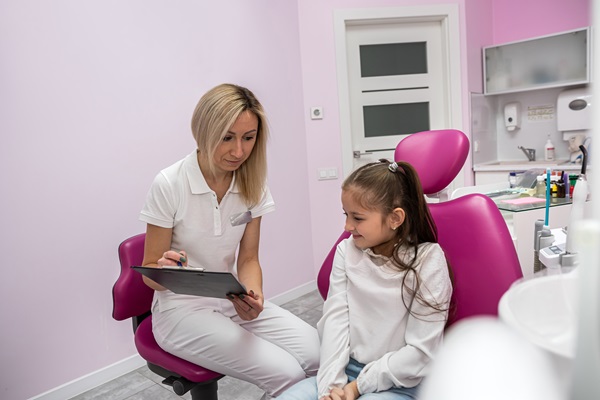Caring for Baby Teeth: 3 Tips for Parents From a Kids Dentist

Wondering what a kids dentist recommends for baby teeth? Read on to learn more. Giving children the best oral health care is one of the most important jobs parents have. The ideal kids' dentist will lay the foundation for healthy gums and teeth for life. Keeping your child's smile healthy requires following a specific routine. Although it can be easy to ignore the primary teeth, caring for these sets of teeth is just as important as caring for the adult ones. Below are some suggestions to help you provide optimal oral care for your child.
3 Tips from a kids' dentist for baby tooth care
It is important to start early. Good oral hygiene begins before the baby has teeth. Use a damp washcloth to clean the child’s gums. Rub the gums lightly to stimulate proper growth.
Once the first tooth appears, parents should schedule their kid's very first dental visit. The American Academy of Pediatric Dentistry suggests kids see a kids dentist by their very first birthday.
Parents must care for the developing teeth. Many parents believe caring for baby teeth is not important because they will be replaced with permanent teeth. However, this practice is highly inadvisable. The very first teeth create a healthy pathway for the permanent ones. When the kids are about two years of age, the teeth are big enough to begin brushing. It is advisable to brush at least two times daily with a fluoride toothpaste.
Also, ensure the kid is getting enough fluoride. The kids dentist may suggest fluoride treatment when necessary.
1. Fight against cavities
Typical signs of a baby getting cavities are discoloration and pitting in the teeth. Food trapped on the tooth is one cause of cavities. This could occur if the infant sleeps with a bottle in their mouth. To avoid this issue, parents should take the bottle away once the child has stopped feeding.
2. Visit the dentist regularly
To keep the kid’s teeth healthy, visiting the dentist regularly is necessary. The American Dental Association suggests children visit the dentist two times a year for routine cleanings and checkups. These frequent visits allow the dentist to spot possible issues earlier, suggest appropriate remedies, and instruct parents on the best ways to look after their child’s teeth at home. The kids dentist will make these visits fun and useful for parents and their wards.
3. Be patient and supportive
Many kids are scared when they have to do something new like brushing or flossing or visiting the dentist. Parents should do their best to make dental hygiene a fun routine. They can offer small rewards to the child for their effort and make the process stress-free. Children will be less nervous about dental care if their parents make it a positive experience. This approach could change their mindset about oral health for a long time.
The bottom line
One's teeth make it possible to eat, talk, and smile. Good dental habits start in the beginning of the child's life to keep their teeth healthy. The best ways to maintain great oral health are to brush and floss regularly, speak with the kids' dentist regularly, and get enough fluoride. Book an appointment with our pediatric dentistry office today to get started.
Request an appointment here: https://parksidepediatricdentists.com or call Parkside Pediatric Dentists at (925) 504-4011 for an appointment in our Concord office.
Check out what others are saying about our dental services on Yelp: Kids Dentist in Concord, CA.
Related Posts
Preventing cavities is an essential component of pediatric dentistry. Cavities are common in children, and catching them early is important. Avoiding them in the future is even more crucial as the child grows up. If you want to avoid the risk of future cavity formation, here are the details from a pediatric dentistry professional.Pediatric dentistry…
In pediatric dentistry, dental professionals understand that parents play a big role in their children's oral health. You are a guide and model along the way, helping your children build healthy habits and routines. However, cavities in children are common. According to the Centers for Disease Control and Prevention, more than 50% of children between…
Pediatric dentistry is an area of dentistry that focuses on the oral health of children. Starting good dental hygiene habits early in life is important. As the Centers for Disease Control and Prevention states, more than 50% of children under the age of nine have had at least one cavity in their baby teeth, and…
Dental crowns are important in pediatric dentistry. Each primary tooth is a living guide for the development of permanent teeth. But baby teeth can also suffer from decay. So restoring these teeth is important for the general health of your child. If you want to know if pediatric dentistry uses dental crowns, here are the…


